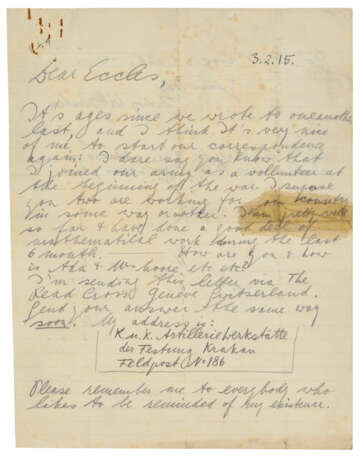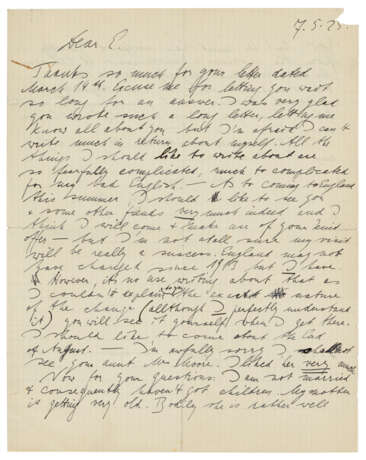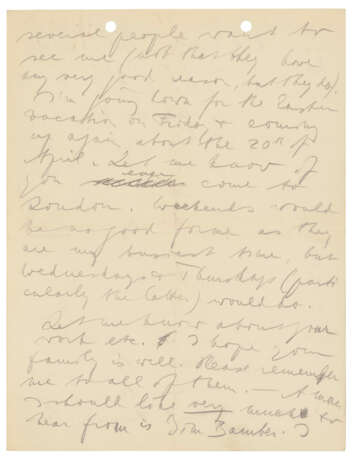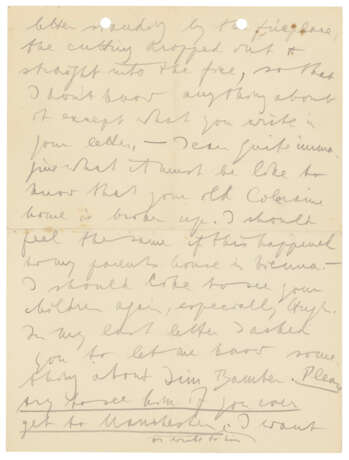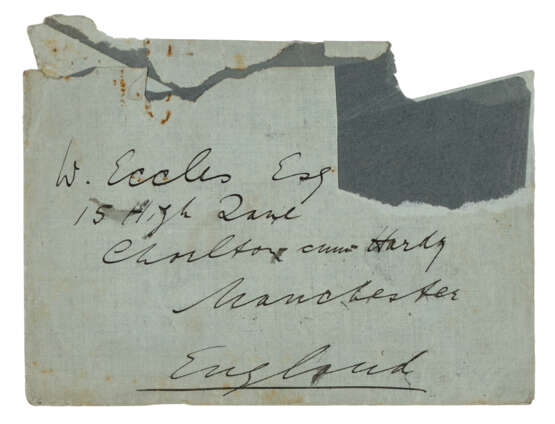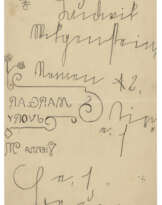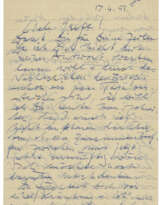ID 1109110
Los 309 | Ludwig Wittgenstein (1889-1951)
Schätzwert
£ 30 000 – 50 000
7 autograph letters signed (‘L.W’ and ‘Ludwig Wittgenstein’) to [William] Eccles (‘E’, ‘Eccles’), Alleegasse 16, [Vienna], [Poland], Otterthal, [Lower Austria], Trinity College and 81 East Road, Cambridge, [July 1912] - 27 March 1939
In English. 19.5 pages in total, various sizes, 225 x 174mm to 340 x 210mm, in pen and pencil, the first letter with two pencil annotations ?in the hand of Eccles. One envelope. Provenance: Sotheby's, 18 & 19 May 1989, lot 354 (part; one letter not present here).
An important series of letters offering rare autobiographical detail, written before and during WWI, from his wilderness years after the war, and soon after his return to Cambridge: making oblique reference to the difficulties of the 1920s, his fears of returning to England, and his occasional ambivalence about his career at Cambridge. The correspondence opens with a letter dated July 1912 in another hand, written from the Palais Wittgenstein in Vienna, in which Wittgenstein urges his friend to consider a trip to Germany if he can secure some first class work experience, otherwise he may as well accept a job in England, and compliments him on his memory for engineering matters: ‘This is not all together commonplace because most people (e.g. myself) can only make real use of a small amount of experience in their work because their experience is not so alive in them’. Writing while serving in the Austrian army – ‘It’s very nice of me to start our correspondence again’ – he informs his friend that he is well and has completed a great deal of mathematical work in the last 6 months (3 February 1915). In his first letter to Eccles after the First World War, Wittgenstein expresses his joy to hear from his friend (‘for some reason or other I was convinced that you either were killed in the war or, if alive, that you would hate Germans & Austrians so much that you would have no more intercourse with me’), announces the publication of the Tractatus (‘the book which – as you perhaps remember – I started writing before the war was published three or four years ago in England’, and which ‘shows you that I’m alive’) and demurs to offer much more about his life in recent years – ‘I would have to write a book’ – apart from the fact that he is a school-teacher; he would like to meet, ‘but I haven’t got much time and no money to come to England as I have given away all my money about 6 years ago’; he should have come to England last summer ‘to see a friend of mine Mr Keynes (whose name you may know)’, who would have paid his expenses, but ‘I was so much afraid that the long time and the great events (external & internal) that ly [sic] between us would prevent us from understanding one another’ (10 March 1925). Two months later, he is still unable to give a full account of recent life events to Eccles – ‘All the things I should like to write about are so fearfully complicated, much to [sic] complicated for my bad English’ – and while he appreciates the idea of a visit to England, ‘I’m not at all sure my visit will really be a success. England may not have changed since 1913 but I have’; as to Eccles’ questions, he informs him that he is not married, so is without children, and reports on his family, mentioning one brother killed in the war and he and the other brother held captive (7 May 1925). In the first of his letters after his return to England, he finds himself very busy, with a research fellowship at Trinity signifying no more financial difficulties and more time to devote to his work, although ‘As a matter of fact any capacity for the particular kind of work will in all probability have left me in 2 or 3 years & then I shall probably resign’ (10 March 1931); in a later letter from Trinity, he empathises with the loss of Eccles’ childhood home (‘I should feel the same if this happened to my parents house in Vienna’), urges him to see Jim Barber in Manchester, one of the few people with whom he got on well during his time there, and agrees with his friend’s point about ‘enjoying life 100%’ (30 October n.y.). The last letter sees Wittgenstein waiting for his naturalisation papers, which he applied for 10 months ago, and for his British passport in order to travel to Vienna to see his sisters, who are in a ‘difficult & dangerous situation’; he describes his appointment to the chair of philosophy at Cambridge as very flattering, but is a little ambivalent about it: ‘I don't get any kick out of my position (except what my vanity and stupidity sometimes gets)’ (27 March 1939).
Wittgenstein met the physicist and pioneer in radio communications William Henry Eccles (1875-1966) when he first came to England to study at the University of Manchester. The letters to his friend and mentor begin before the outbreak of the First World War, on a break from his studies in Cambridge. When war broke out, Wittgenstein volunteered for the Austrian army, utilising his engineering skills working in an artillery workshop in Cracow in 1915, and was captured on the Italian front in 1917. The 1920s were his wilderness years: he gave away his money to his family members, turned his back to academia, worked as a gardener, contemplated becoming a monk and pursued a relatively unhappy career as a school-teacher. Frank Ramsey and John Maynard Keynes persuaded Wittgenstein – eager to renew pre-war friendships – to visit England in August 1925; he returned to Cambridge to resume work on philosophy in January 1929, submitting the Tractatus in lieu of a thesis in order to qualify for a degree and to apply for a teaching position. He was elected to a five-year fellowship at Trinity in December 1930 and, with the help of Keynes, to a chair in philosophy in 1939, having sought permanent employment – and British citizenship – following the Anschluss.
| Herkunftsort: | Österreich, England |
|---|
| Herkunftsort: | Österreich, England |
|---|
| Adresse der Versteigerung |
CHRISTIE'S 8 King Street, St. James's SW1Y 6QT London Vereinigtes Königreich | |||||
|---|---|---|---|---|---|---|
| Vorschau |
| |||||
| Telefon | +44 (0)20 7839 9060 | |||||
| Aufgeld | see on Website | |||||
| Nutzungsbedingungen | Nutzungsbedingungen |


